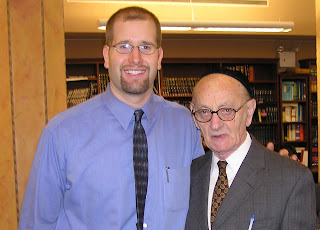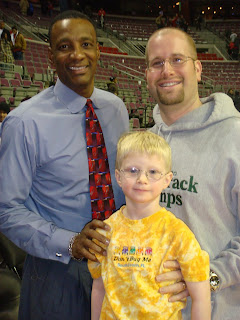 Chabad Lubavitch has been getting a lot of press recently since the tragic murders of Rabbi Gavriel and Rivka Holtzberg (z”l), the Chabad shlichim (emissaries) in Mumbai, India who were killed by terrorists. Their story underscores the important mission of these Chabadnik leaders willing to relocate their families to far-flung corners of the earth for kiruv (Jewish outreach). I’ve heard from several young people who stopped at the Chabad-Lubavitch Nariman House while backpacking through India only to be treated so warmly by Rabbi Holtzberg and his wife. I experienced similarly warm hospitality when I visited a Chabad House in Sumy, Ukraine a few years ago with students from the University of Michigan.
Chabad Lubavitch has been getting a lot of press recently since the tragic murders of Rabbi Gavriel and Rivka Holtzberg (z”l), the Chabad shlichim (emissaries) in Mumbai, India who were killed by terrorists. Their story underscores the important mission of these Chabadnik leaders willing to relocate their families to far-flung corners of the earth for kiruv (Jewish outreach). I’ve heard from several young people who stopped at the Chabad-Lubavitch Nariman House while backpacking through India only to be treated so warmly by Rabbi Holtzberg and his wife. I experienced similarly warm hospitality when I visited a Chabad House in Sumy, Ukraine a few years ago with students from the University of Michigan.
I have always been amazed and impressed by Chabad’s devotion to the Jewish people. Their marketing machine and political savvy are the envy of Jewish leaders everywhere. But I have also been skeptical at times about their approach and their agenda, especially on college campuses where the Jewish students are hyper-impressionable.
 Due to their belief that Rebbe Menachem Schneerson (left) is the mashiach (messiah), many have cynically described Chabad Lubavitch as the closest religion to Judaism. Regardless of this belief, which is often denied by Chabadniks in large metropolitan Jewish communities where such a messianic tenet would not be well received, Chabad is doing important work throughout the globe.
Due to their belief that Rebbe Menachem Schneerson (left) is the mashiach (messiah), many have cynically described Chabad Lubavitch as the closest religion to Judaism. Regardless of this belief, which is often denied by Chabadniks in large metropolitan Jewish communities where such a messianic tenet would not be well received, Chabad is doing important work throughout the globe.
In many Jewish communities, Chabad has taken on the important job of training young people to work with the developmentally disabled through The Friendship Circle. The program, now with over sixty chapters, matches teenage volunteers who become friends and mentors to children with special needs. Chabad has also pioneered important programs in the Former Soviet Union, including in the devastated community of Chernobyl.
If you’re interested in a fair and in-depth study of Chabad Lubavitch, I would highly recommend Sue Fishkoff’s The Rebbe’s Army.
The most daring, insightful coverage of Chabad however can be found in last month’s issue of New Voices magazine. The young columnists of the New Voices journal demystify Chabad, answering questions like: Why, unlike most ultra-Orthodox, do the Lubavitch reach out to rather than reject secular Jews? What do they get when you put on tefillin? Are they Zionist or anti-Zionist? What do they think of mainstream Jewish movements and what do those movements think of them? Do all Lubavitchers even share the same views on these issues?
A blogger on the Moment Magazine blog writes: “Takedown or not, New Voices has done what no other serious Jewish publication has dared do: subject Chabad to the same journalistic scrutiny every powerful, religious movement deserves.”
The New Voices issue includes Chabad-related stories about the Agriprocessors Kosher meat scandal, an interview with a Reform rabbi about the place of Chabad in the religious life of secular Jews, a critique of non-Orthodox support for Chabad, and an exploration of the contemporary meaning of the Chabad headquarters at 770 Eastern Parkway.
 The interview with the Reform rabbi who shares his thoughts on Chabad is very interesting. The rabbi is Rabbi Rick Jacobs (left), Senior Rabbi of Westchester Reform Temple in Scarsdale, New York. I met Rabbi Jacobs last year at a STAR Foundation PEER Alumni retreat and was extremely impressed. Rabbi Jacobs tells a funny story in the New Voices interview:
The interview with the Reform rabbi who shares his thoughts on Chabad is very interesting. The rabbi is Rabbi Rick Jacobs (left), Senior Rabbi of Westchester Reform Temple in Scarsdale, New York. I met Rabbi Jacobs last year at a STAR Foundation PEER Alumni retreat and was extremely impressed. Rabbi Jacobs tells a funny story in the New Voices interview:
I was in midtown Manhattan, and I’m walking down the street and this wonderful friendly warm Chabadnik stops me and says, ‘Are you Jewish?’ I’m walking along, I’m wearing a grey suit. I don’t know, maybe I have curly Jewish hair. I said, ‘Yes, are you?’ And he looked at me and started to laugh and he pointed to his tzitzit and to his beard. I said, ‘You know, appearances are not always reality.
Rick’s story reminds me of another story: Two Jewish Theological Seminary rabbinical students (a man and a woman) were walking by the main gate of Columbia in New York’s Upper West Side when a Chabadnik asked the man if he put on tefillin that morning. His response? “No, but she did!”
I’m not sure what the ultimate attraction to Chabad is for so many — not just the impressionable Jewish college students who flock to Chabad houses for the Rebbetzin’s homemade chicken soup and challah, whiskey shots with the rabbi, or hot cholent on Shabbat afternoon. For some college students it may well be that the Chabad rabbi looks, well, more authentically Jewish than his or her Reform or Conservative rabbi back home — which means more Eastern European and more pious.
The bigger question for me is the new fad of contemporary, progressive Jewish families joining Chabad congregations (in many communities called simply “The Shul”). I know this is driving many rabbis crazy. In some cases, rabbis are seeing their congregants attend Chabad congregations to complement their other synagogue membership. They may go to Chabad for a Shabbat service or even a holiday service (e.g., Simchat Torah), but wouldn’t think of not attending their ancestral synagogue for High Holiday services or to celebrate their child’s bar or bat mitzvah. But in other cases, Reform and Conservative congregations are seeing their membership numbers decrease to the benefit of the Chabad shul down the street. Again, this could be chalked up to the “authenticity factor” or it could be something deeper. Perhaps it is the warmth that the Chabad rabbis display in their outreach efforts much like the warmth that was a trademark of Rabbi Gavriel and Rivka Holtzberg, stationed in Mumbai and racking up all those “mitzvah points” through their generosity.
May their memories be for blessings.
(c) Rabbi Jason Miller | http://blog.rabbijason.com | Twitter: @RabbiJason | facebook.com/rabbijasonmiller










